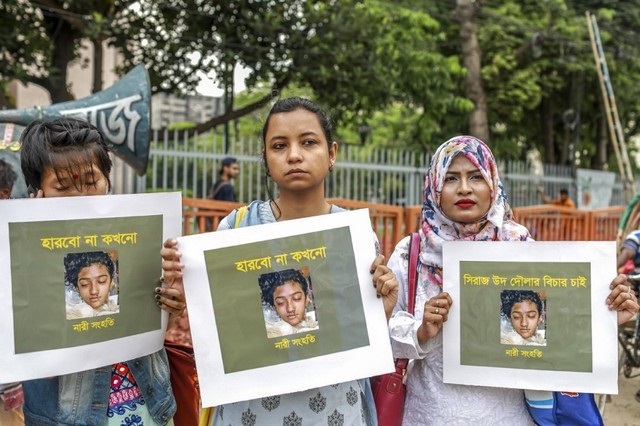
The killing of 19-year-old Nusrat Jahan Rafi has sparked outrage across the South Asian nation of 165 million people and put police action in the case under the spotlight.
Protesters in the capital Dhaka staged demonstrations for an 11th day on Sunday, seeking "exemplary punishment" for the killers of the girl.
Police say she was lured to the rooftop of the Islamic seminary she attended in Feni, south of the capital, where her attackers ordered her to withdraw a police complaint against the head of the school.
Bangladesh girl burned to death on teacher's order: police
When she refused, she was doused in kerosene and set on fire.
Rafi died in hospital on April 10 after suffering 80 percent burns. At least 20 people, including the head teacher, have been arrested.
Activists say the murder has exposed a "culture of impunity" surrounding sex crimes against women and children, and that fact that those who report harassment often suffer a backlash.
Amid nationwide protests, the Bangladesh government has ordered more than 27,000 schools and colleges to form five-member committee to prevent sexual violence, an official said.
"The committee will be led by female teachers. They will take steps to prevent sexual harassment and take up any complaints," the director of the Directorate of Secondary and Higher Education, Shahedul Khabir Chowdhury, told AFP.
He said the committees were being formed by an order from the country's high court, which in 2009 laid down a set of guidelines to prevent sexual harassment of women and children at workplaces, schools and on the streets.
Rafi went to police in late March to report the harassment and a leaked video shows the local police station chief registering her complaint but dismissing it as "not a big deal".
Police said at least five of those under arrest, including three of Rafi's classmates, tied her up with a scarf before setting her on fire. They had planned to pass off the death as a suicide.
Prime Minister Sheikh Hasina has vowed that all those involved will face action and police say they are investigating why more was not done to protect Rafi.
More than 100 protesters at the country's elite Dhaka University held hands to form a human chain as part of continued demonstrations over the grisly murder.
"I joined the protest because Nusrat Rafi's murder was a wake-up call for all our women," Dhaka University student Antara Labiba told AFP.
"I am also a victim of sexual harassment. I think most women in Bangladesh face sexual harassment in their families, schools, markets and workplaces," she said.
The Manusher Jonno Foundation, a non-government group, says there have been at least 39 cases of children under 18 being raped in Bangladesh since April 2.
Another eight have been subjected to sexual harassment, the group says.










1732354127-0/Untitled-design-(3)1732354127-0-270x192.webp)






COMMENTS
Comments are moderated and generally will be posted if they are on-topic and not abusive.
For more information, please see our Comments FAQ